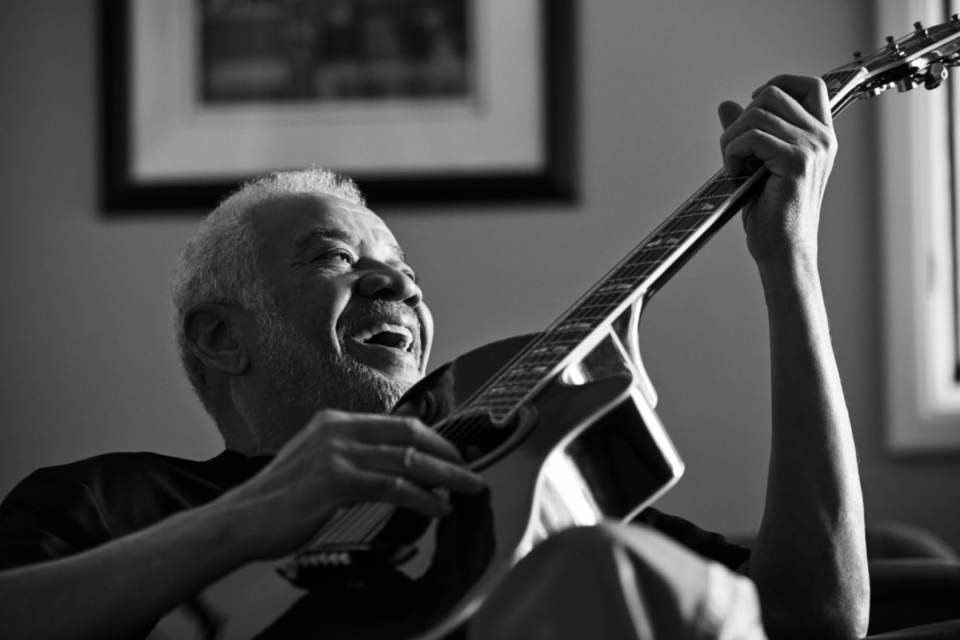‘No One Term Captures This Guy’
Plain Dealer Lays Off All Four Black Women
Underreported: How Undocumented Are Faring
J-Profs Call Fox News a ‘Danger to Public Health’
L.A. Times Promotes Editors Yoshino, Chan, Hilton
Michael Smith, Jamaican Immigrant, to Market NPR
Black Media Companies Share in Stimulus Bill
Coronavirus Claims Maria Mercader of CBS News
‘Photographers Can’t Work From Home,’ Patient Says
5-Part Series on Atlanta Child Murders Debuts
450 Sign ‘Open Letter’ of Support for Gillum
Passings
Short Takes
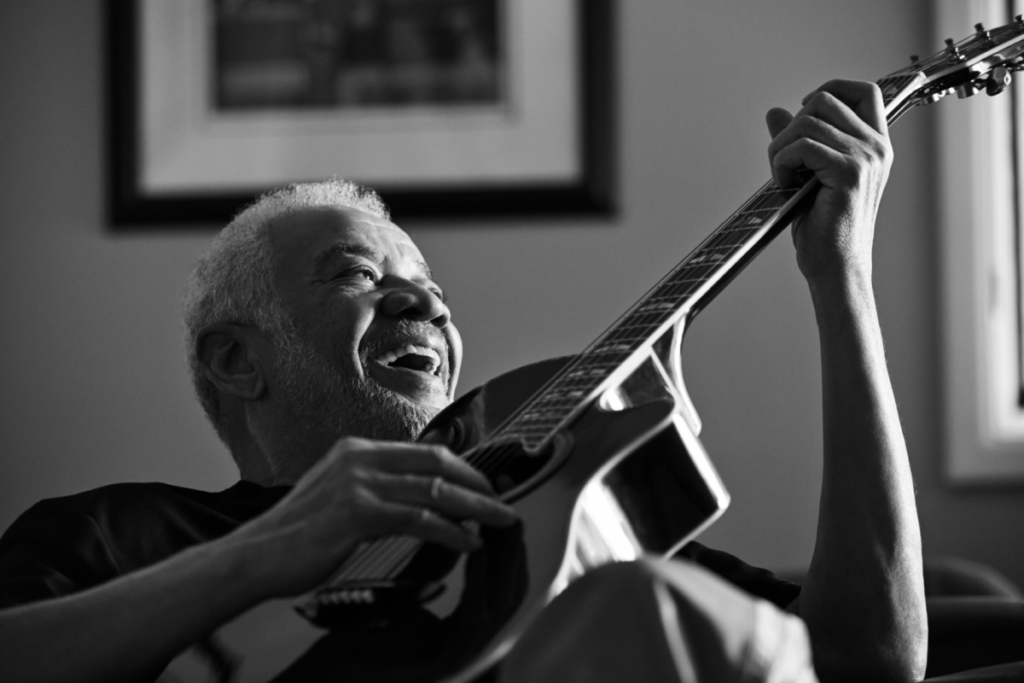
‘No One Term Captures This Guy’
Does “soul singer” encapsulate the late Bill Withers, whose death at 81 was announced on Friday? Headline writers and those writing obituaries and appreciations had to make that decision — if they even considered “soul singer,” a term most popular in the 1960s and 1970s that cropped up in many a headline over the weekend.
No question the singer-songwriter sang soulfully. But so did others such as Richie Havens, Joan Armatrading and Tracy Chapman. They, too, are black, but are they “soul singers”? Somehow, Havens, Armatrading and Chapman don’t seem in the same category as James Brown, Sam and Dave, Otis Redding and Johnnie Taylor, who were no doubt in that category. Where does Withers fit in?
Jon Pareles of the New York Times saw the difference. “[E]ach song was creating its own borderless style and groove on the spot, steeped in but never beholden to blues, gospel, country, jazz, folk, rock or any other defined idiom,” Pareles wrote Friday in an appreciation.
His piece was headlined, “How Bill Withers Defined Soulful Selflessness.”
Chris Morris of Variety said likewise, “His subdued, introspective, often acoustic-based style grew increasingly at odds with the hard funk and disco of the ‘70s . . .”
At Rolling Stone, a lenghty piece by Andy Greene from 2015, headlined, “Bill Withers: The Soul Man Who Walked Away,” was the top-ranked article on Friday and much of Saturday.
“I spend two days at his house in Los Angeles,” Greene messaged Journal-isms Saturday. “This was shortly before he was inducted into the [Rock and Roll] Hall of Fame. I’ve interviewed maybe 1,000 musicians in my 16 years at Rolling Stone, but Bill was one of my favorites. He was so smart and so incredibly funny and honest. I really loved him. It never ceases to amaze me that he wrote all those songs in the span of just a few years and then totally stopped.”
Asked about the term “soul singer” and the comparison with Havens and Armatrading, Greene said, “I view [Richie] Havens as a folk singer and there are grey areas all over music since genres are so vague and broad. But I view Bill as a fusion of soul and rock, but closer to the soul side. It almost varies by song though.”
Bill Withers’ song “I Can’t Write Left-Handed,” about a returning Vietnam veteran, demonstrates his versatility.
In Washington, D.J. Lance Reynolds, in a rarity, devoted nearly all of his two-hour “House of Soul” on Pacifica’s WPFW-FM to Withers’ album cuts. On the air Saturday, he said of Withers, “His voice sounded like your father calling you from across the way.” As with most African Americans commenting on Withers, he didn’t use the term “soul singer.”
“The term ‘soul singer’… He embodied and conveyed the fullness of the term,” Reynolds messaged Journal-isms. “He sang and wrote from the deepest parts of the mind, and put us in touch with the voice inside our heads. So ‘soul’ is both appropriate and limiting in this instance. I would def agree that ‘soul’ sort of encapsulates him, but gosh, we need more vocabulary for this cat!
“Genre wise, I hear blues, spirituals, WV [West Virginia] ‘holler’, funk, folk, and hell ‘Lonely Town, Lonely Street’ (video) has been covered by numerous rock bands. No one term captures this guy. So ‘soul singer’ works in a pinch, but he will have to explain that there was so much more to the man and his music.”
Martin Johnson, writing for HuffPost Black Voices, was another who wrote his piece without using “soul singer.”
“No particular reason,” Johnson messaged.
“At the time I was writing quickly so soul musician made sense to me. He wasn’t just a great singer; he was a great songwriter too, but say singer-songwriter and other genre connotations come to mind. So thinking quickly, musician worked for me. Then at the end, I describe what made his singing so affecting, so I felt that base was covered then too. I don’t think you can read the piece and not come away with the idea that he’s a great singer.”
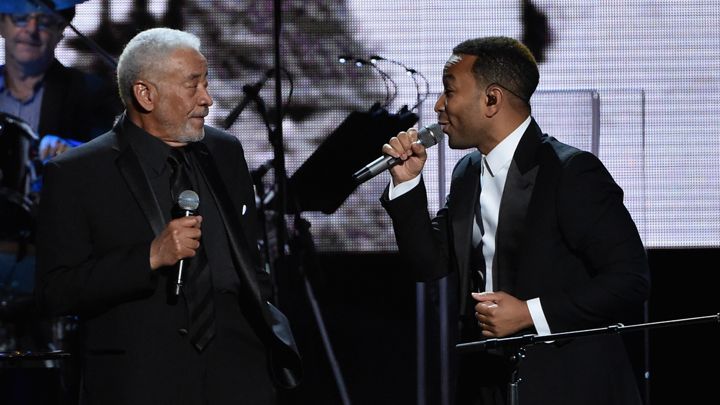
- Christie D’Zurilla, Los Angeles Times: Bill Withers dies: Kamala Harris, John Legend, Alicia Keys pay respects to R&B great
- Mark Kennedy, Associated Press: Lean On Me,’ ‘Lovely Day’ singer Bill Withers dies at 81
- Spencer Kornhaber, The Atlantic: Bill Withers’s Life Was as Rich as His Songs
- Tomas Kassahun, Blavity: Twitter Remembers ‘Ain’t No Sunshine’ Singer Bill Withers After He Passes Away At 81
- Chris Morris, Variety: Bill Withers, Writer and Singer of ‘Lean on Me’ and ‘Ain’t No Sunshine,’ Dies at 81
- Chris Richards, Washington Post: Bill Withers, on repeat
- Anastasia Tsioulcas, NPR: Bill Withers, Singer-Songwriter Of ‘Ain’t No Sunshine,’ Has Died At Age 81
- Douglas Wolk, Los Angeles Times: Bill Withers, ‘Lean on Me’ and ‘Ain’t No Sunshine’ singer-songwriter, dies at 81

Plain Dealer Lays Off All 4 Black Women
“Today, The Plain Dealer laid off 22 journalists, including 18 members of the Plain Dealer unit of the Northeast Ohio News Guild Local 1,” the Plain Dealer News Guild announced Friday from Cleveland.
“More could be gone in the weeks to come.
“We are profoundly disappointed and ashamed that the company laid off every black woman on our staff, leaving a massive gap in knowledge and experience in our newsroom. Our staff is now 81% white, in a city that is 47% black. It is unacceptable.”
Separately, “the Detroit Free Press will begin furloughing staff as it looks to save money amid reduced ad revenue during the coronavirus outbreak,” Allan Lengel reported Monday for Deadline Detroit.
Lengel also wrote, “Reporters, editors and photographers get a 25-percent reduction by going without pay for a week every month for the next three months. . . .”
The Greater Cleveland Association of Black Journalists said in a statement Sunday, “With only two black male journalists left at The Plain Dealer, such an imbalance in reporting and storytelling impacts our ability to be a watchdog for the public and tell stories from our perspective. It also affects the vitality of our journalistic calling.”
Among those who gave the Cleveland Guild permission to publicize their names, the union said, were:
- “Marvin Fong, a sharp sports photographer who also was known for getting ‘the shot,’ including Cuyahoga County Commissioner Jimmy Dimora being led away in handcuffs and John Demjanjuk removed by ICE agents.
- “Olivera Perkins, a national award-winning business reporter, who covered labor and employment. In 2010, she chronicled the effort Hugo Boss employees mounted to save their plant. Last year, her Pathways to Prosperity series with Patrick O’Donnell highlighted potential solutions for connecting education to job prosperity.
- “Branson Wright, an award-winning sports reporter and videographer who has always been able to get interviews with stars others could not, from LeBron James to Charles Barkley and Shaquille O’Neal. He was a triple threat, covering all major sports teams in Cleveland.
- “Roxanne Washington, who was with the paper for 30 years, covering everything from fashion, to home and garden, to general features. . . .”
The four black women are Perkins; Washington; Julie Washington, home and garden writer, no relation to Roxanne; and Melodie Smith, copy editor/news curator at the Plain Dealer Publishing Co.
The Guild statement continued, “Of the 77 journalists covering Northeast Ohio for the company, only 16 remain at The Plain Dealer and only 14 of those are union members. . . .”
In the Plain Dealer, Editor Tim Warsinskey attributed the layoffs to “the ongoing financial challenges in the newspaper business. It is devastating for each of those we had to let go, and it is the hardest thing a newspaper editor ever has to do.
“I have worked alongside most of them for decades and Cleveland journalism is our shared DNA. As I noted when these layoffs first were announced, I agonize for my staff but do not pretend to fully realize their distress today. . . .”
Perkins wrote on Facebook, “Looking forward to the next opportunity God has in store for me,” and responded to a sympathizer, “As a longtime reader, you are aware of the impact this intense disregard for journalism, readers and journalists has had on Cleveland and Northeast Ohio.”
- Sam Allard, The Scene, Cleveland: 22 Plain Dealer Newsroom Staffers Laid off in Advance Union Purge
- Dave “Dino” DeNatale and Tyler Carey, WKYC, Cleveland: The Plain Dealer lays off 22 journalists, citing ‘industry challenges’
- Rick Edmonds, Poynter Institute: Hey, Ben Smith: No, it is not time to ‘let newspaper chains die‘
- Tim Gallagher, Editor & Publisher: Business of News: Why Dissonant Voices are Crucial to Every Newsroom (March 20)
- Kerry Flynn, CNN: Coronavirus is speeding up the collapse of local newsrooms (March 22)
- Scott Nover, adweek.com: Dozens Fired at CQ Roll Call, a Publication Known for Reporting Inside Washington
(Credit: Freedom Forum) (video)
Too Few Virus Stories on Undocumented
When newsroom leaders assess their coverage of the coronavirus crisis, they should be asking themselves not just “what’s missing,” but “who’s missing,” the leaders of journalists of color organizations, as well as LGBTQ and female journalists agreed Wednesday.
For Hugo Balta, president of the National Association of Hispanic Journalists, the answer was clear: Undocumented immigrants, who were left out of the $2 trillion stimulus package passed last month.
They work in the service and hospitality industries, two of the hardest hit in the pandemic.
As Catherine E. Shoichet reported March 27 for CNN, “immigrant rights advocates say leaving this group out of the $2 trillion plan isn’t merely a matter of dollars and cents, and it isn’t something that only affects undocumented workers and their families. It’s a dangerous decision, they argue, that puts the whole country’s health at risk as the novel coronavirus spreads.
“Critics counter that it’s not the US government’s place to bankroll someone who broke the law, and that as unemployment skyrockets, American workers should come first.
“This isn’t just another set of salvos in the political battle over immigration that’s raged in our country for decades. It’s a very different debate — because of who could be impacted, and what’s at stake. . . .”
Balta told the group, “We need to do a better job of telling the stories of undocumented immigrants and getting them out of he shadows.”
Participating in the webinar (video), organized by the Freedom Forum’s PowerShift Project and posted online, were Freedom Forum fellow Jill Geisler, moderator, and representatives of the Asian American Journalists Association, National Association of Black Journalists, National Association of Hispanic Journalists, Native American Journalists Association, NLGJA: The Association of LGBTQ Journalists, South Asian Journalists Association and Journalism & Women Symposium.
The project prepared an online resource page of the “best practices” that arose in the discussion, including caring for members’ mental health, the plight of freelancers and grants available for reporting on the COVID-19 crisis.
They also discussed the status of their conventions, which in large part finance their year-round activities.
Drew Berry, executive director of the National Association of Black Journalists, said that NABJ still plans its July 8-12 joint convention in Washington with NAHJ, but that the final decision is ultimately up to the federal and D.C. governments, which for now have discouraged gatherings of 10 or more. Berry said NABJ is exploring alternatives. Some groups, such as AAJA and NLGJA, have already postponed spring events.
Sharif Durhams, president of NLGJA, said this is the time for the groups to work closer together so as not to conflict when event dates are shifted.
The latest journalism organizations to cancel this year’s convention are ACES: The Society for Editing and the National Society of Newspaper Columnists.
Another webinar is scheduled for Wednesday with the Institute for Nonprofit News, Investigative Reporters and Editors, Local Independent Online News Publishers, Local Media Association, National Press Photographers Association, News Leaders Association, Online News Association, OpenNews, Radio Television Digital News Association, Society for News Design and Society of Professional Journalists among the participants.
J-Profs Call Fox ‘Danger to Public Health’
“Dozens of professors and teachers of journalism and communications have signed a scathing open letter calling out Fox News’ coverage of the coronavirus crisis, describing it as ‘a danger to public health,” Lee Moran wrote Thursday for HuffPost.
More than 100 academics and journalists had signed the letter as of Friday, accusing the conservative, top-rated cable network of contributing “to the spread of a grave pandemic.”
Also on Thursday, the Washington League for Transparency and Ethics sued Fox News, “saying the network’s consistent downplaying of the pandemic in the early stages of the outbreak in the United States encouraged people to behave in ways contrary to what was required to stem the spread,” Matthew Renda reported Friday for Courthouse News Service.
But, Renda wrote, the suit “likely won’t get far, according to legal experts.”
Moran continued for HuffPost, “The signatories, led by Columbia Journalism School Professor Todd Gitlin, call on Fox Corporation chairman Rupert Murdoch and his son, company CEO Lachlan Murdoch, “to help protect the lives of all Americans” by ensuring the network airs information “based on scientific facts.”
“The letter notes that Fox News’ viewers — including President Donald Trump — have ‘been regularly subjected to misinformation.’ . . . ”
People of color were among the signatories:
Naeemul Hassan, assistant professor, University of Maryland; LynNell Hancock, professor, Columbia University Graduate School of Journalism; Krishnan Vasudevan, assistant professor, University of Maryland; Kalyani Chadha, associate professor, University of Maryland; Nina Alvarez, assistant professor, Columbia University Graduate School of Journalism; Maggie Rivas-Rodriguez, professor of journalism, University of Texas at Austin; Wenhong Chen, founding co-director, Center for Entertainment and Media Industries, associate professor of media studies and sociology, Moody College of Communication, University of Texas at Austin.
Also, J.A. Adande, Medill School, Northwestern; Kyu Ho Youm, University of Oregon; Susan Mango Curtis, Medill School, Northwestern University; Ali Noor Mohamed, United Arab Emirates University; and Gi Woong Yun, Reynolds School of Journalism, University of Nevada, Reno.
The Week reported Monday, “Fox Business announced Friday that it has ‘parted ways’ with Trish Regan, a prime time host who gained notoriety for suggesting on her March 9 show that the COVID-19 coronavirus was a politically motivated ‘scam.’ . . . On MNSBC Sunday morning [March 29], Vanity Fair’s Gabriel Sherman said ousting Regan appears to be part of a larger effort to limit legal liability tied to the disconnect between Fox’s public and private responses to the pandemic. . . .”
Sean Hannity responded to the professors’ letter in an interview with Newsweek.
“Go to my web site and you’ll see irrefutable evidence that I have taken this seriously way before most in the media did,” Hannity said. “I warned in January that it was dangerous because it was highly contagious, but some people were asymptomatic, so it would spread quickly. . . .”
- Justin Baragona, Daily Beast: Fox News Stars Now Pretend They Never Said What They Said About the Coronavirus
- Josh Feldman, Mediaite: Trump Scolds Fox’s John Roberts at Briefing: ‘Are You Working for CNN’ Now?
- Jonathan V. Last, The Bulwark: The Malicious Irresponsibility of Rush Limbaugh
- Ben Smith, New York Times: Rupert Murdoch Put His Son in Charge of Fox. It Was a Dangerous Mistake. (March 22)
- Jamil Smith, Rolling Stone: Fox News, Still a Danger to Public Health (March 18)
- Kara Swisher, New York Times: Fox’s Fake News Contagion
L.A. Times Boosts Yoshino, Chan, Hilton
Kimi Yoshino, Sewell Chan and Shani Hilton, three journalists of color, were among those promoted Wednesday in changes at the Los Angeles Times announced by Executive Editor Norman Pearlstine.
 “Yoshino (pictured) becomes the second managing editor, joining Scott Kraft. Each of them will take on additional assignments and responsibilities in the weeks to come,” the Times announced. Yoshino became deputy managing editor in 2018 after being business editor for four years.
“Yoshino (pictured) becomes the second managing editor, joining Scott Kraft. Each of them will take on additional assignments and responsibilities in the weeks to come,” the Times announced. Yoshino became deputy managing editor in 2018 after being business editor for four years.
“Deputy Managing Editor Sewell Chan (pictured below) will succeed Nicholas Goldberg as editor of Editorial, Op-Ed and Sunday Opinion pages. Goldberg will become an Op-Ed columnist and an associate editor, reporting to and working with Pearlstine on extending The Times’s civic outreach.” Chan joined the Times in New York in 2018 from The New York Times, where he was reporter and editor,
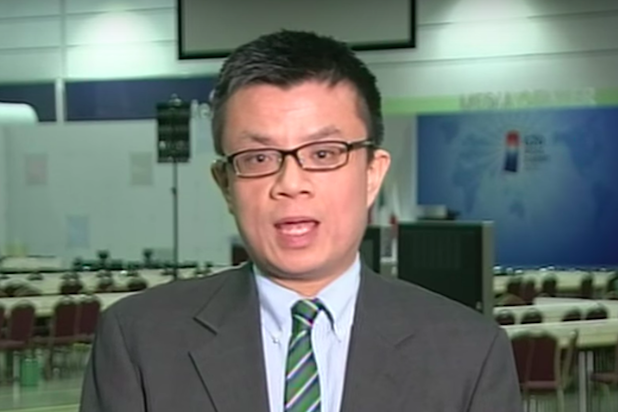 “Deputy Managing Editor Shani Hilton recently took responsibility for leading and coordinating The Times’ coronavirus coverage while continuing with her other responsibilities.” Hilton joined the Times last year from BuzzFeed News, where she was vice president of news and programming.
“Deputy Managing Editor Shani Hilton recently took responsibility for leading and coordinating The Times’ coronavirus coverage while continuing with her other responsibilities.” Hilton joined the Times last year from BuzzFeed News, where she was vice president of news and programming.
Pearlstine, a veteran of Time Inc., Bloomberg and The Wall Street Journal, was named executive editor in 2018 and pledged that diversity would be a priority.

In October 2019, the L.A. Times Guild succeeded in establishing a contract that secured pay raises and a commitment for hiring managers to interview at least two people from underrepresented communities during vacant positions.
Pearlstine messaged Journal-isms on Friday, “With regard to the new committee on inclusiveness and diversity, it was an easy one to agree to since that has been what I have been doing for a very long time.
Kraft added by email, “As Norm says, the guidelines outlined in the Guild contract were things we were already doing and have continued to do. We have not only been considering multiple diverse candidates for every position, but we have filled several open jobs with candidates from unrepresented minorities in the past year. Of course, hiring has slowed down considerably in recent weeks, so there’s not much to talk about at the moment.”
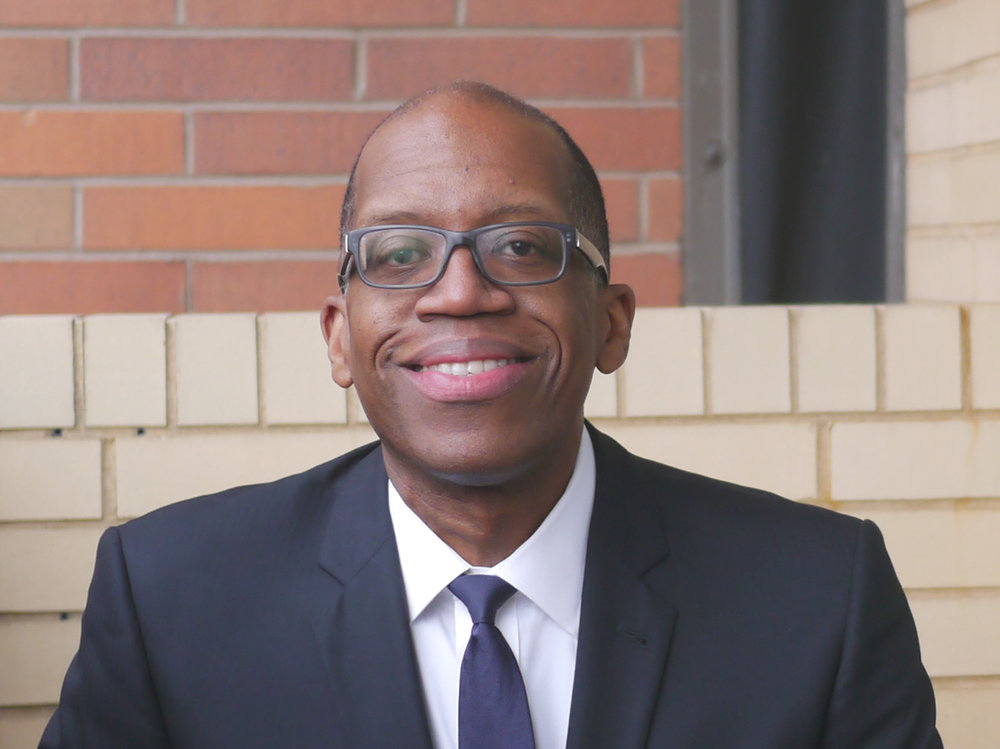
Michael Smith, Jamaican Immigrant, to Market NPR
“Michael Smith, recognized brand marketing executive who most recently served as SVP, GM Digital Channels for Sripps Networks, will become NPR’ s head marketer, announced John Lansing, President and CEO of NPR,” NPR announced on Wednesday.
“Smith brings more than 30 years of experience in entertainment brand marketing, content, digital, and revenue generating brand extensions. His appointment as Chief Marketing Officer begins April 6 and follows an extensive national search.
“ ‘Michael is a strategic thinker and an extremely creative media executive who has spent his career finding new ways people consume content across an increasingly diverse audience population,’ said Lansing. ‘He is joining NPR at a time when we must extend the reach of our content beyond our traditional audiences to fully serve the American public and he is uniquely qualified to help us do so. . . .’
“ ‘It’s essential to NPR’s future that its content and audience reflect America’s full diversity. As a Jamaican immigrant and avid NPR station and podcast listener, I’ve been personally engaged by the new and diverse voices in NPR’s content,’ said Smith. ‘But NPR’s overall audience is still not very diverse. I believe the content has broad appeal to the next generation of audiences, we just need to get our story out to more people. I’m so excited to join a team of talented marketing and communications pros committed to this effort.’ ”
Lansing has described the demographics of NPR’s audience as “overwhelmingly white.“
A Pew Research Center study last month found that 43 percent of white Democrats get news from NPR, compared with 10 percent of black Democrats.
Lester Holt of NBC News and Hari Sreenavasan joined in this PSA asking people to stop spreading #coronavirus misinformation and to fact-check before sharing online. The video was created by the Poynter Institute’s MediaWise project, a non-profit, nonpartisan media literacy program supported by Google.org and Facebook.
Black Media Companies Share in Stimulus
“African American-owned media companies and small businesses are included in the massive $2 trillion coronavirus stimulus bill passed by the U.S. Senate,” Stacy M. Brown reported Tuesday for the National Newspaper Publishers Association.
“ ‘Yes, this does include minority-owned media. They are included as small businesses,’ a top-ranking Senate source told NNPA Newswire.
“A closer read of the 888-page legislation reveals that $10 million has been allocated for minority business centers for technical assistance.
“Another $10 million has been designated for the Minority Business Development Agency within the Department of Commerce to provide grants to Minority Business Centers and Minority Chambers of Commerce to provide counseling, training, and education on federal resources and business response to the COVID-19 for small businesses.
“In response to COVID-19, the National Newspaper Publishers Association (NNPA), a trade organization of the nation’s African American-owned newspapers and media companies, established a Coronavirus Task Force and Resource Center to assist the Black community through the pandemic. . . .”
- Rekha Basu, Des Moines Register: COVID-19 has shown the best in so many. But one proposal aims to sacrifice a population.
- Charles M. Blow, New York Times: The Racial Time Bomb in the Covid-19 Crisis
- Greg Bowens, Deadline Detroit: Gov. Whitmer, You Don’t Have A Plan For Black Communities, So Here’s One
- Dr. Oliver Brooks, National Newspaper Publishers Association: COVID-19 and Black People
- Jonathan Capehart, Washington Post: Trump and governors can slow the spread of covid-19 in prisons and jails
- Jonathan Capehart, Washington Post: 240,000 coronavirus deaths: ‘In what circle of hell is that a good outcome?,’ asks Susan Rice
- Louis Chan, AsAmNews: Reports of coronavirus related hate crimes against Asian Americans hit 11-hundred in two weeks
- Committee to Protect Journalists: Journalism in the time of coronavirus
- Julia Craven, Slate: How Racial Health Disparities Will Play Out in the Pandemic
- Editorial, Buffalo News: Don’t forget the prisoners
- Editorial, Philadelphia Inquirer: Defuse the ticking time bomb of coronavirus in jails and prisons
- Dana Floberg, Free Press: How to Report on the Digital Divide & COVID-19
- Tana Ganeva, The Intercept: New York City Has Done Almost Nothing to Protect 70,000 People in its Homeless Shelters From Coronavirus Spread
- Kristen Hare, Poynter Institute: The coronavirus is the story of our lifetime. Here are resources, training and funding to help your newsroom tell it
- Dana Hedgpeth, Darryl Fears and Gregory Scruggs, Washington Post: ‘We could get wiped out’: American Indians have the highest rates of diseases that make covid-19 more lethal
- Mark Jurkowitz and Amy Mitchell, Pew Research Center: Cable TV and COVID-19: How Americans perceive the outbreak and view media coverage differ by main news source
- Soraya Nadia McDonald, The Undefeated: In 1918 and 2020, race colors America’s response to epidemics
- Darren A. Nichols, New York Times: Detroit Is Mourning
- Andrés Oppenheimer, Miami Herald: Mexico’s president wants to divert attention from his coronavirus fumbles
- Fabiola Santiago, Miami Herald: Florida’s governor fails the unemployed and many others during coronavirus pandemic
- Kimmy Yam, NBC News: Black, Asian and Hispanic House caucus chairs unite in ‘no tolerance’ for coronavirus racism
(Credit: CBS News) (video)
Virus Claims CBS News’ Maria Mercader
“CBS News is mourning the loss of Maria Mercader, a network veteran who covered breaking news for nearly three decades and, most recently, helped shape strategy for the network’s correspondents and reporters,” the network announced March 29.
That role included “helping lead the network’s efforts in pushing workplace diversity for the past four years,” Sanjana Karanth added for HuffPost.
CBS continued, “Maria was 54 and died from coronavirus in a New York hospital. She had been on medical leave for an unrelated matter since the last week in February.
“Maria fought cancer and related illnesses for more than 20 years, and was an inspiration each time she returned to work after a setback threatened to end her life. . . .”
“Maria was active in coordinating CBS News participation in the Asian American Journalists Association, the National Lesbian and Gay Journalists Association and the National Association of Black Journalists. . . .”
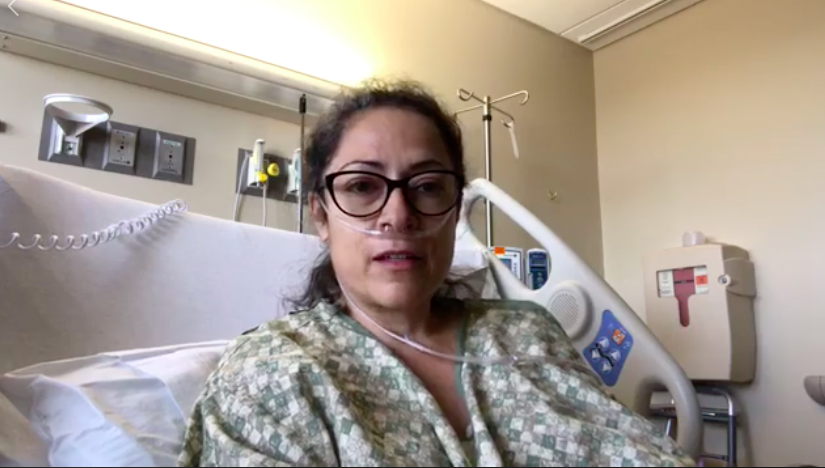
‘Photographers Can’t Work From Home’
“Lola Gomez did everything she was supposed to do — she had enough supplies and didn’t have to go to the store,” Kristin Hare reported Thursday for the Poynter Institute. “She lives alone. She practiced social distancing. She wore a mask and gloves when she went out. She had hand sanitizer.
“ ‘But I’m a photographer, and even though the reporters are working from home, photographers can’t work from home’ said Gomez, who works for the Austin (Texas) American-Statesman, from a hospital bed, a clear tube wrapped around her face.
“Gomez posted a video sharing her story on Facebook and Twitter on Wednesday night and invited people to share it.
“Her recent work includes haunting photos of empty Austin streets.
“She’s healthy, Gomez said, runs every day and has her asthma under control. And because she’s 42 and not in the high-risk category, Gomez said she had to try five times to get tested.
“ ‘So, unfortunately, I had to reach the point where my life was at risk to get medical assistance.’
“She talked about what it feels like to have the coronavirus: She can only take short breaths, she coughed so much that she couldn’t breathe at all, and all that coughing made her back ache.
“No one, she said, should assume they’re immune from this disease. . . .”
- Stacy M. Brown, National Newspaper Publishers Association: Acclaimed Houston Forward Times Columnist Tests Positive for Coronavirus, Admitted to ICU
- Elvia Díaz, Arizona Republic: Univision reporter Alejandro Barahona highlights the COVID-19 risks journalists face
- Paul Farhi, Washington Post: Why are journalists skipping Trump’s daily coronavirus briefing? Not enough news to risk their health.
- Kerry Flynn, CNN: Photojournalists are risking their lives to capture the pandemic
- Emil Guillermo, Asian American Legal Defense and Education Fund: Masked in America? It’s hard to wear a face mask in the U.S., but it shouldn’t be
- Phillip Morris, Plain Dealer, Cleveland: Bicycling for sanity during a coronavirus pandemic
- Leonard Pitts Jr., Miami Herald: Geez, even Superman and Wonder Woman have been laid low by the coronavirus
- Rubén Rosario, Pioneer Press, St. Paul, Minn.: A word for those risking their lives amid the coronavirus crisis
- Barry Saunders, Saunders Report: Suffering from Netflix fatigue? Here’s how to really rejuvenate yourself.
- Mark K. Wright, Shadow League: For Pro Athletes, the Haircut Struggle is Very Real While Under Quarantine
5-Parter on Atlanta Child Murders Debuts
“Anthony Terrell believes an imprisoned man currently serving two life sentences may not have been the person who murdered his brother as part of a killing spree that rocked Atlanta four decades ago,” Jonathan Landrum Jr. reported from Los Angeles Friday for the Associated Press.
“Terrell hopes new light can be shed nationwide on the murders that terrorized the African American community in the city within a two-year time span with the HBO documentary ‘Atlanta’s Missing and Murdered: The Lost Children.’ The five-part series, which begins Sunday, will explore how the victims’ family members and others remain skeptical about Wayne Williams being the sole killer, despite evidence linking him to those murders and 10 others. . . .”
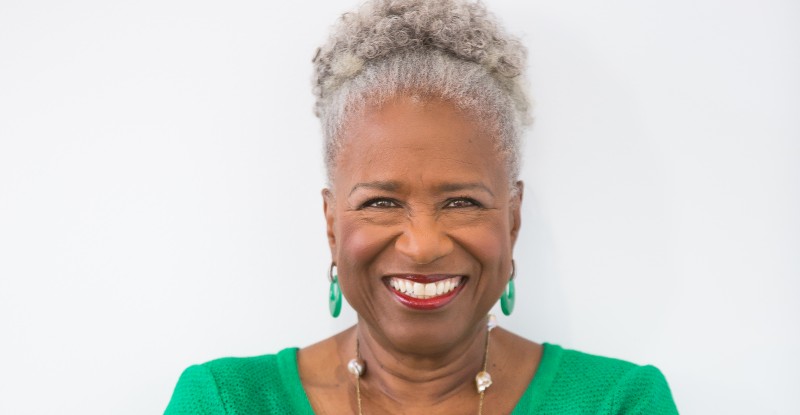
Landrum also quoted retired Atlanta broadcast journalist Monica Pearson, who as Monica Kaufman, reported on the killings. She “said the case was mishandled by officials at a time when Atlanta was on the rise after Maynard Jackson was elected as the city’s first black mayor in 1973. . . .
” ‘The city was up and coming, and we didn’t want anything to tarnish that image,’ she said. ‘I think that if those cases had been solved in some ways, if there had been more than one murderer, it would have changed the political structure. It would have affected the business in Atlanta. It would have changed this city forever.’ ”
450 Sign Letter of Support for Gillum
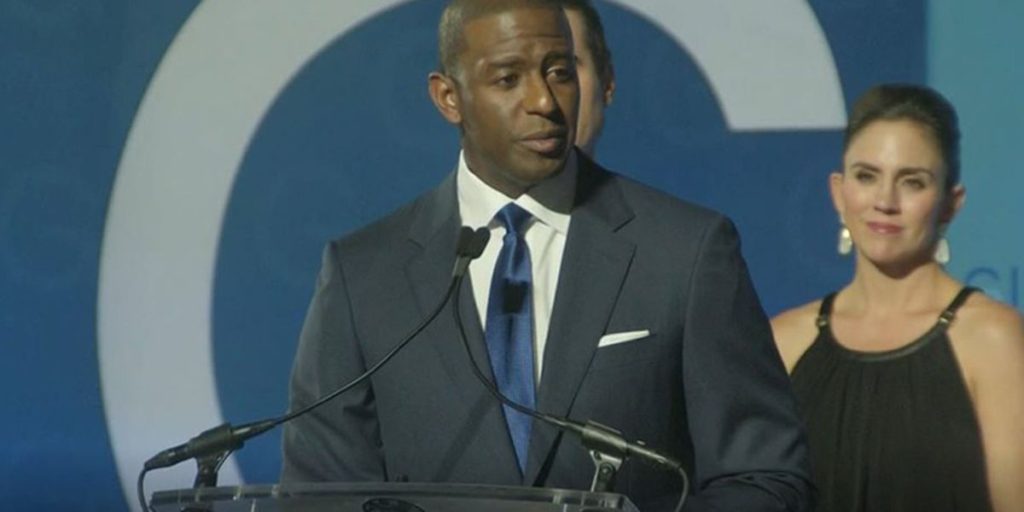
“I believe in grace, and by extension, in forgiveness. However, when it comes to former Tallahassee mayor and Florida gubernatorial candidate Andrew Gillum, who in mid-March was found in a compromising position in a Miami hotel room, I have struggled to forgive as swiftly as others,” writer and author Michael Arceneaux explained Wednesday on medium.com.
Arceneaux also wrote, “Nevertheless, when I think of what he has been accused of and with whom, I’m still stuck on how a man who was on the rumored short-list for vice president in 2020 could have (allegedly) behaved so recklessly. No, not recklessly: fucking stupidly. How can someone at his age at this stage in his career be (allegedly) acting so damn goofy? . . .
“I want Black men to stop feeling like they may have to hide parts of themselves to have a certain kind of life. I feel for those who suffer under the constraints most of us are born with as Black boys and men. At the same time, we need to call out selfishness when we see it. . . .”
As reported in this space on March 19, many mainstream outlets omitted information about the presence of a gay escort in the hotel room with Gillum, including the Associated Press, the New York Times and the Tallahassee Democrat, which circulated its account to other Florida papers.
“I feel the press would not have left out the details . . . of the story [if] the person were a woman (salacious all the same) so I don’t especially love the coverage not to mention the people behind it,” Arceneaux messaged Journal-isms.
Still, others rushed to publish the made-for-tabloid details, and Michael Seaberry, a science teacher, and Preston Mitchum, a writer among other roles, circulated an “open letter” in which they denounced the media for what they called an attack on black men. It garnered 450 signatures by March 27, the day the letter was published on theGrio.com.
“Sharing photos of Mayor Gillum’s naked body, especially in such a vulnerable state, is inexcusable and triggering to a community that has seen our own bodies fetishized and/or slain across the nation, from the lynching tree to Main Street. . . .
“We want to see Black men smiling, loving whomever they choose to love, taking care of their family, helping lead the community in change efforts — anything besides rote pornography of pain and suffering. . . .”
Passings
- “Jazz pianist Ellis Marsalis Jr., who died Wednesday of complications from covid-19, was a great musician but an even greater teacher,” Eugene Robinson wrote in an appreciation Thursday in the Washington Post. “Through his pupils — especially his famous and highly acclaimed sons — he helped shape the sonic landscape of America. . . .” Marsalis was one of several notable figures who died in the past week after contracting the coronavirus. The Undefeated
- The Rev. Dr. Joseph E. Lowery, co-founder of the Southern Christian Leadership Conference, was laid to rest after a private funeral ceremony in Atlanta Saturday. He died at 98 on March 27. Shelia Edwards of Mableton, Ga., delivered an up-close tribute to Lowery in the Cobb County Courier on Tuesday. “If you were ever blessed to be in his space for any amount of time, you were the recipient of something special, something great, something that only Dr. Lowery could bestow upon you…his unabashed wisdom and stirring life lessons,” Edwards wrote. A public memorial service is planned for Oct. 6, which would have been Lowery’s 99th birthday.
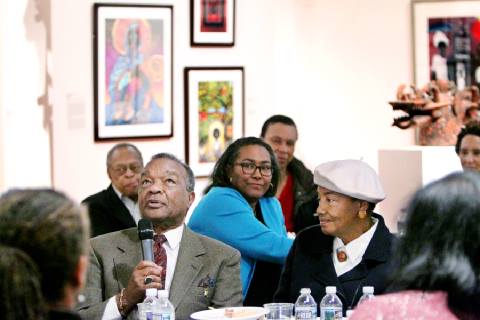
- “David C. Driskell, an artist, art historian, art collector, art teacher, author and curator who became a primary sponsor and advocate for the role of African American art in the national culture, died April 1 at a hospital in Washington,” Bart Barnes wrote in the Washington Post. “He was 88. The cause was complications from the novel coronavirus, said Rodney Moore, his nephew and arts manager.” Driskell hosted the Journal-isms Roundtable at the University of Maryland in 2017, in the center named after him.
- “Harriet Glickman, who in 1968 persuaded Charles M. Schulz, the creator of ‘Peanuts,’ to add an African-American character to his roster of Charlie Brown, Snoopy and the rest of the gang, died on March 27 at her home in Sherman Oaks, Calif.,” Daniel E. Slotnik reported Friday for the New York Times. “She was 93.” Slotnik wrote, that after the assassination of Martin Luther King Jr. in 1968, “She began thinking of ways the mass media shaped the unconscious biases of America’s children, she later wrote, and ‘felt that something could be done through our comic strips.’ . . .”
- Anick Jesdanun, 51, deputy technology editor for the Associated Press, died in New York Thursday of coronavirus-related complications, his family said, Ted Anthony reported Friday for the AP. “For more than two decades, Jesdanun helped generations of readers understand the emerging internet and its impact on the world. And while his work may have been about screens and computers and virtual networks, Jesdanun’s large life was about the world and exploring all of the corners of it that he could, virtual and physical alike. . . .”
Short Takes
- The Reporters Committee for Freedom of the Press listed five takeaways from the third annual report of the U.S. Press Freedom Tracker: “Protests were once again the most dangerous place for journalists, but reporters were also physically attacked at President Trump’s rallies, among other places. . . . Arrests of journalists went down in 2019, but subpoenas reported to the Tracker went up. . . .Border officials targeted journalists with harassing questions, searches and detention. . . . A San Francisco police raid of a journalist’s home and office stood out as the most concerning search and seizure. . . .Federal ‘leak’ prosecutions continued, and prosecutors obtained controversial criminal charges against WikiLeaks founder Julian Assange.”
- Pakistani authorities ordered on Friday four men, including a British militant, convicted of the 2002 murder of U.S. journalist Daniel Pearl, to be detained for three months despite a lower court’s ruling to overturn their convictions,” Syed Raza Hassan and Gibran Naiyyar Peshimam reported Friday for Reuters.
- A survey of how mainstream Canadian news media portray indigenous peoples in stories about renewable energy projects found that, in “almost every case, the journalist who may have been attempting to balance the article with both sides began with quotes from Indigenous peoples, before turning to those framed as having technical, policy or applied expertise on the topic — often non-Indigenous peoples. While this can be seen a technique in journalism to front-load a story with top-heavy facts, knowing that not all readers read beyond the headline or first paragraph, what we saw was the final word given to non-Indigenous peoples. . . .” Chad Walker’s story was published on Jan. 22, updated Jan. 24, on The Conversation and Friday on indianz.com.
- “We have waived membership fees through the end of 2020,” Mihir Zaveri, president of the South Asian Journalists Association, announced March 20. “Sign up and become a SAJA member at no cost. As such, all of SAJA’s member resources are now free, including our job bank, where you can find job openings or post job listings. . . .”
 Entrepreneur Byron Allen (pictured), who was reportedly interested in acquiring the broadcasting company Tegna, has dropped out of the bidding, “Tegna said that it engaged with two of the bidders and provided them with extensive non-public due diligence information. After the COVID-19 pandemic disrupted the stock market, both of those bidders told Tegna they were ceasing discussions,” Jon Lafayette reported March 29 for Broadcasting & Cable. More on Allen in American Prospect.
Entrepreneur Byron Allen (pictured), who was reportedly interested in acquiring the broadcasting company Tegna, has dropped out of the bidding, “Tegna said that it engaged with two of the bidders and provided them with extensive non-public due diligence information. After the COVID-19 pandemic disrupted the stock market, both of those bidders told Tegna they were ceasing discussions,” Jon Lafayette reported March 29 for Broadcasting & Cable. More on Allen in American Prospect.
- “ESPN is moving up the release of its Michael Jordan documentary ‘The Last Dance’ from June to April,” ESPN announced on Tuesday. “The 10-part series will now begin April 19. . . .”
- Christine Ma and Constance Holloway Brossa were among those re-elected to the board of ACES: The Society for Editing in voting from Feb. 15 to March 1. Ma is a copyeditor and proofreader who specializes in children’s and young adult fiction and nonfiction books. Brassa’s Charlotte, N.C.-based independent editing/writing service, Content Spectrum, “assists clients with branding, content editing and writing, graphic design, publications production, social media marketing and website design/maintenance.”
- At Cosmopolitan, “Among those beginning their new jobs remotely next week is new beauty director Julee Wilson,” Kathryn Hopkins reported March 27 for WWD. “She was previously global beauty director at Essence and prior to that, held various editorial positions at HuffPost and Real Simple. Wilson replaces Carly Cardellino, who departed in January. . . .”
- Jennifer Thomas, associate professor at Howard University, was named 2019 Teacher of the Year by the Scripps Howard Foundation in partnership with the Association for Education in Journalism and Mass Communications, the groups announced Friday. The award is to be presented at the 2020 AEJMC conference in San Francisco Aug. 6-9.
- Danyell Irby, a former senior editor at public radio’s “Marketplace,” has been named acting executive director of news at WYPR-FM in Baltimore, LaFontaine E. Oliver, president and general manager, announced. Irby helped launch the daily COVID-19 podcast “The Daily Dose.”
- “The house of Venezuelan journalist Darvinson Rojas was raided and he was detained by agents of the Special Action Forces (FAES) of the Bolivarian National Police (PNB) on March 21, in Caracas,” Paola Nalvarte reported March 24 for the Knight Center for Journalism in the Americas. “Journalist and freedom of expression groups in the country say it was for his reporting on the coronavirus in Venezuela. . . .”
- In Mexico, “Journalist María Elena Ferral was shot eight times while in central Papantla in the state of Veracruz around 2 p.m. on March 30, according to Diario de Xalapa, a newspaper for which she was a correspondent, Teresa Mioli reported Tuesday for the Knight Center for Journalism in the Americas “She died six hours later. . . .”
- “Ugandan journalist Perez Rumanzi was admitted into hospital after being severely beaten by members of the Ugandan police force,” the International Federation of Journalists reported Friday.
- “Togo’s media regulator, the Broadcast and Communications High Authority, ordered the privately owned daily Liberté and biweekly L’Alternative to suspend publication on March 23, and ordered weekly Fraternité suspended on March 30, according to copies of the suspension orders reviewed by CPJ,” the Committee to Protect Journalists said Friday. The French ambassador “alleged that the papers had published ‘serious, unfounded, and calamitous’ accusations against the French government. . . .”

